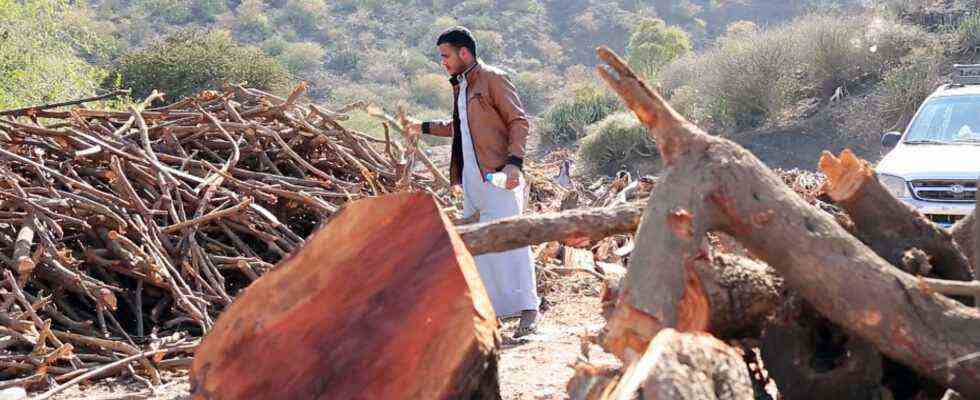As of: 01/15/2022 4:39 p.m
Due to the lack of energy, people in Yemen have to be resourceful: A baker from Sana’a drives into the mountains and cuts down firewood there. Meanwhile, the war party Saudi Arabia is giving itself a green coat of paint.
Bilal Ash-Sharaabi is actually a baker. But now he has also become a lumberjack, out of necessity. For more than a year he has had the following rule: without wood there is no fire – and without fire there is no bread. Ash-Sharaabi’s Bakery is located in the center of Sanaa, the capital of Yemen. The inside reminds you a little of a Neapolitan pizzeria. His employees discuss loudly and pull pizza-sized flatbreads out of the stone oven every second.
They operated this stone oven with gas for years. But getting gas is now almost impossible for the people of the capital. Too little gas is produced in the country and gas imports from abroad are blocked by the Saudi-led war alliance. “Because of the war, we can’t get gas, not even for baking. So I have to look for wood in the surrounding valleys,” complains Ash-Sharaabi.
He sets out for the Al-Haymah Valley in a pickup van. The journey is arduous: it leads over the barren mountains and takes three hours. Arriving in the valley, he meets a good dozen men. They are all here to collect wood and use it in Sana’a or sell it. They all have to feed their families.
Reluctant lumberjack: Bilal ash-Sharaabi can only fuel his bakery with laboriously felled acacia trunks.
Image: ARD Cairo
Biggest humanitarian crisis in the world
In hardly any other country are people starving as badly as in Yemen. War has been raging in the poorest Arab country for seven years now. Hardly any of the 30 million inhabitants who has not lost a relative or a friend.
At least 150,000 people died in this war – if you add indirect consequences of the war such as hunger or lack of access to health care, according to the United Nations it is probably twice as many. 80 percent of the people are dependent on humanitarian aid, around 400,000 children are undernourished.
Numerous warring factions
The parties to the conflict continue to fight each other mercilessly. On the one hand there are the insurgent Houthis, who control large parts of the north including the capital and rule over around 20 million Yemenis. On the other hand, the military coalition led by Saudi Arabia, which uses warships to make it difficult for shiploads of food, medicine, oil and gas to dock at the port of Hodeidah.
In mid-December they also bombed Sana’a airport, and air traffic is now open again, at least for UN aid deliveries. In addition to the Houthis and the military coalition, there are other, smaller warring factions: the Southern Transitional Council, which is supported by the United Arab Emirates, troops from ex-President Saleh’s nephew, and jihadist groups such as al-Qaeda and the “Islamic State”.
Battles for Marib and Shabwa Province
In the last few days there has been fighting mainly in the center of the country around the city of Marib. A strategically important location, with large oil and gas fields nearby. Hundreds of fighters died in the fighting.
The Houthi had been on the advance for a long time, but earlier in the week troops backed by the Emirates and Saudi Arabia reported a success south-east of the city: retaking the oil-rich province of Shabwa. It remains to be seen who will have the upper hand in the center of the country in the medium term.
Cut down trees instead of planting trees
Saudi Arabia’s Crown Prince Mohammed bin Salman is the mastermind behind the military coalition blocking foreign gas imports into Yemen. He likes to make grand announcements, so in 2015 he promised a “quick victory in Yemen.”
Last year he announced plans to plant 50 billion trees in the Middle East to reduce carbon emissions and protect the environment. The fact that Saudi foreign policy, which he had a major influence on, is now indirectly forcing Yemenis to cut down trees adds another absurd touch to the brutal war.
Meanwhile, baker Ash-Sharaabi has unpacked his chainsaw in the Al-Haymeh valley. He has chosen a beautiful acacia tree, cuts it down and puts the thin and thick branches on the back of his van.
At least he is satisfied with the wood he has harvested from the valley: his employees can use it to ignite a fire in the stone oven for around a week. Exhausted, he makes his way home, three hours back over the mountains. “It takes a lot of energy and time,” he says. “And all for a bit of wood.”
This is how the mountain slopes in Yemen are cut down – the lack of energy leaves the Yemenis no other choice.
Image: ARD Cairo

